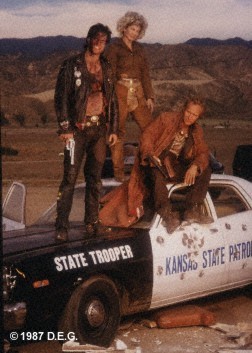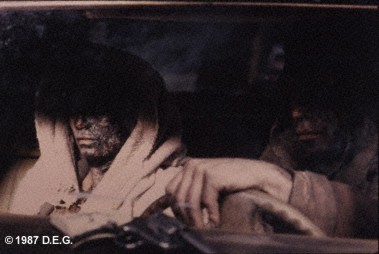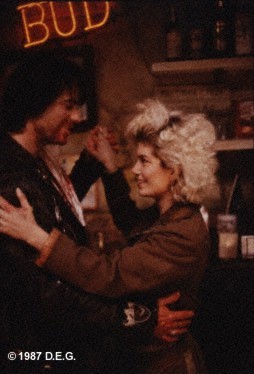Want to see pictures? Click here!
Here's a piece from PHARROUT magazine I wrote about my favorite Bill Paxton movie. All images are copyright DEG, and are courtesy this site. Pharrout has the first reprint rights, which basically means no copying without asking me for permission first. There's more to come, so keep checking back!
NEAR DARK Retrospectre
 by
Maddalena Romano
by
Maddalena Romano
Introduction
Synopsis
What makes this film so good
Major themes
Symbolism
Conclusion
Introduction
Hands down, this is the best vampire movie ever
made--not for its fearful content, or for its carefree destruction of human
life, but for the scores of underlying messages it provides. NEAR DARK
is violent and raw, and it shows the world an underbelly of human emotion
that all people have but few care to acknowledge. It's romantic, and
that's what's frightening, because I don't know of anyone who would not find
this kind of violence somehow seductive. As such, this
film is just too good for one retrospectre. But I will do my best.
Synopsis
While out carousing one night, Caleb (Adrian
Pasdar) spies Mae (Jenny Wright), and gives her a lift home. Soliloquies
galore follow, but the song is still the same: boy meets girl, boy
likes girl, girl bites boy, boy says ouch. This particular girl, Caleb
learns, has a bite that stings worse than he could have imagined, as he soon
realizes walking home doubled over in pain, his flesh begining to sear.
But he never gets home, as he is scooped up by a mobile home amidst a
soon to be planted field.
 Here
he is introduced to the clan. Severen (Bill Paxton), spur poised above
Caleb's jugular, is ready to go to town. Jesse (Lance Henriksen) gives
the word, and Diamondback (Jenette Goldstein) and Homer (Joshua Miller)
agree, deaf to Mae's pleas. Finally, after flinging herself between
Severen's spur and a very confused Caleb, Mae tells them of what she had
done, and they reluctantly take him along with them.
Here
he is introduced to the clan. Severen (Bill Paxton), spur poised above
Caleb's jugular, is ready to go to town. Jesse (Lance Henriksen) gives
the word, and Diamondback (Jenette Goldstein) and Homer (Joshua Miller)
agree, deaf to Mae's pleas. Finally, after flinging herself between
Severen's spur and a very confused Caleb, Mae tells them of what she had
done, and they reluctantly take him along with them.
Switching the mobile home for a stolen Winnebago, they proceed across Oklahoma state lines into Hope, Kansas. Not understanding his plight, Caleb tries to get home. He makes it to a bus station, and gets as far as on the bus, only to return to Mae. Mae, waiting for him, bite open her wrist for him to feed, and he does, gladly, not fully knowing why (sexual innuendo galore follow here, boys and girls).
Mae tries to explain how and why to kill, but Caleb fails to understand. Though we see the others feed with no remorse--Jesse and Diamondback teaching two carjackers a lesson, Severen showing us why you should never pick up hitchhikers, and Homer posing as an injured young boy--Caleb cannot get up the urge to kill the truck driver Mae so lovingly picked out for him. Instead, he has the Cajun explain to him how to drive a 13-gear 18-wheeler. Mae ends up killing the driver, and feeding Caleb once again (more sexual innuendo, and a plot point crops up that never was, but should have been, used).
 Furious,
Jesse insists the boy make a kill, and they go to a bar. Slaughtering
the patrons mercilessly in the best scenes of the movie (Bill Paxton at his
best, with Lance Henriksen a close second in these scenes), again Caleb
proves he cannot kill (although he does learn, thanks to Severen, that he is
really strong and impervious to buckshot), letting his proposed victim
escape. As Jesse assumed, the boy went to the law, and they tracked
our protagonists down that next morning. Battling it out in the
daylight, every bullet hole left a burn mark on our fragile group. Caleb,
in a moment of selflessness, decides to go after the van.
Furious,
Jesse insists the boy make a kill, and they go to a bar. Slaughtering
the patrons mercilessly in the best scenes of the movie (Bill Paxton at his
best, with Lance Henriksen a close second in these scenes), again Caleb
proves he cannot kill (although he does learn, thanks to Severen, that he is
really strong and impervious to buckshot), letting his proposed victim
escape. As Jesse assumed, the boy went to the law, and they tracked
our protagonists down that next morning. Battling it out in the
daylight, every bullet hole left a burn mark on our fragile group. Caleb,
in a moment of selflessness, decides to go after the van.
Driving the van into the bungalow, he aides them in escaping, earning their respect. But it is at the Godspeed motel where they end up meeting with Caleb's father Loy (Tim Thomerson) and sister Sarah (Marcie Leeds), who had been searching for him this whole time. Faced with a choice, Caleb choses his family, and escapes to their car. Explaining the situation as best he could to his father, he begs for transfusion, to which dad, skilled veterinarian that he is, obliges.
Transfusion having worked (God knows why), one night he discovers Mae outside of his home, and tells her of what's happened. Realizing later that Mae was a distraction and that the nomads had kidnapped Sarah at the bidding of Homer, who had developed a crush on her, he goes after them on horseback. Confronting Severen, he proceeds to run him over with a tractor trailer. That not working, he then jackknifes the trailer using the knowledge he gained from the Cajun truck driver, blowing Severen into the next century (or the bushes, whatever). Next, Jesse and Diamondback try their hand at it, only to have Mae avert it, an act of which Jesse clearly did not approve. Mae finally rescues Sarah at great risk to herself, jumping out of a moving car into broad daylight. Homer, following her, burns up in the process, as do Jesse and Diamondback (miraculously, Mae did not).
Caleb, returning home with Sarah and Mae, tranfuses Mae, so that she too, may walk freely during the day. They hug, and the story ends abruptly.
What
makes the film so good
For one thing, absent is the "Pity me, I'm a
vampire" crap. Can there exist some vampire that are resentful of
who they are? Of killing other so that they can survive? Of
course. Can there exist some humans that are resentful of
committing murder to survive? Of course. They are called vegetarians.
But most human being don't think about the destruction of animal life
with a constant sense of remorse. Some of us like meat. The
general attitude is one of 'I have to eat to survive.' And so goes
NEAR DARK, with of course the one glaring exception that the humans are now
the food.
These vampires relish who they are. Let's face it: if you could live forever, wouldn't you be on top of the world? If you were impervious to bullets, wouldn't you hold up a liquor store? If you could kill and steal and get away with it, wouldn't you? And if you could ensure that all the people you loved in this world could live forever with you, wouldn't you? My answer is yes, and I'm sure there are others who would agree.
 Secondly,
there is a nobility to the characters that, though existent, is understated.
Think of them as the nouveau-riche of the night breed. Gone is
the obvious status associated the the title of "Count" given to
Vlad the Impaler, and in its place rides the humility (if you can call it
that) of Lee and DeVore (of Man the Hunter fame). In the case
of Near Dark, the idea of "noble savage" is indeed appropriate,
and will be expanded upon later.
Secondly,
there is a nobility to the characters that, though existent, is understated.
Think of them as the nouveau-riche of the night breed. Gone is
the obvious status associated the the title of "Count" given to
Vlad the Impaler, and in its place rides the humility (if you can call it
that) of Lee and DeVore (of Man the Hunter fame). In the case
of Near Dark, the idea of "noble savage" is indeed appropriate,
and will be expanded upon later.
Third, the language of this film allows for broad-spectrum interpretations, such as the ones I am about to make. Because of this flexibility, this realism, it speaks to a wide audience on a number of different levels. Ergo, it becomes a cult classic for a number of different reasons.
Major
Themes
 There
are several themes in this film, of which I care to point out three. The
first of these themes is the solidarity of the familial unit. Let us
first examine our "black sheep". Seeing as how almost all of
the characters joined this group of nomadic "vampires"
voluntarily, there exists a loyalty to the preservation of this unit that
can only be defined as the love of the family. They teach each other,
they look out for each other, they work to impress their parents, they seek
retributions for wrongdoings committed unto another family member. There
is a head of the household--a father figure, as well as a matriarch. There
is the independent oldest child, the rebellious teenager, the introverted
youngster. There is a teasing among siblings. There is
comraderie among father and son. There is love between mother and
father. And these are supposed to be vicious killers? They sound
pretty normal to me. In fact, the one glaring omission I find is in
the absence of the mother figure for the "white sheep". Those
that are supposed to be the ones capable of throwing that first stone do not
have the mother figure that the others do.
There
are several themes in this film, of which I care to point out three. The
first of these themes is the solidarity of the familial unit. Let us
first examine our "black sheep". Seeing as how almost all of
the characters joined this group of nomadic "vampires"
voluntarily, there exists a loyalty to the preservation of this unit that
can only be defined as the love of the family. They teach each other,
they look out for each other, they work to impress their parents, they seek
retributions for wrongdoings committed unto another family member. There
is a head of the household--a father figure, as well as a matriarch. There
is the independent oldest child, the rebellious teenager, the introverted
youngster. There is a teasing among siblings. There is
comraderie among father and son. There is love between mother and
father. And these are supposed to be vicious killers? They sound
pretty normal to me. In fact, the one glaring omission I find is in
the absence of the mother figure for the "white sheep". Those
that are supposed to be the ones capable of throwing that first stone do not
have the mother figure that the others do.
 What
does this speak to? On the one hand, it could be saying that there are
many types of familial arrangements, and that the traditional nuclear
representation of family as father, mother, and siblings is by no means the
only acceptable one. On the other hand (we have different fingers, but
I digress), it could be saying that the presence of a traditional family
does not subtract from said family's dysfunctionality. However, I do not
feel that either is the case. For one, the latter is false in this
case because, as I explained in the previous paragraph, our friendly
neighborhood nomads functioned beautifully as a family. Secondly, while the
former is a valid general statement, I believe it was Bigelow's intention to
present a much more human, ergo vulnerable, side to a stereotype thought to
be invincible.
What
does this speak to? On the one hand, it could be saying that there are
many types of familial arrangements, and that the traditional nuclear
representation of family as father, mother, and siblings is by no means the
only acceptable one. On the other hand (we have different fingers, but
I digress), it could be saying that the presence of a traditional family
does not subtract from said family's dysfunctionality. However, I do not
feel that either is the case. For one, the latter is false in this
case because, as I explained in the previous paragraph, our friendly
neighborhood nomads functioned beautifully as a family. Secondly, while the
former is a valid general statement, I believe it was Bigelow's intention to
present a much more human, ergo vulnerable, side to a stereotype thought to
be invincible.
The second theme for me would have to be the representation of the effects of drug use. They itch for a fix, so much they'd "kill" for it, and their bodies pay the price of neglect with unbearable withdrawal. They shrink from the sunlight like so many methadone addicts (Lance Henriksen's idea). At one point, a police officer asks Caleb flat out, "What are you on, son?" I personally do not see the moralizing quality this kind of representation affects, so I do not take it to be a billboard against drug use. To me it is just an interesting observation.
My third theme, however, I find most intrinsic. Here we have the idea of the noble savage, the range-roving hunter-gatherers living off the fat of the land (so to speak). It is a romanticized version of life, wild and free, no cares, nothing to tie you down. You steal what you need, and you do not take crap from anyone. It is the life which most those heavily ladden with mortgages and credit card debt dare to dream. There is an overarching envy at how they relish their standing in life, and yet, the pitfalls of the daily life of such a band is poignantly portrayed, as they burn with the touch of daylight.
Symbolism
Racked with symbolism, the language of film
stands out, second only to biblical references. Caleb was a biblical
soldier; Mae, a derivative of Mary, the mother of Christ; and Sarah, the
wife of Abraham. In the bar scene, one man was shot square in the back
as he gazed at the ceiling, arms outstretched. This Christ-figure then
drops to his knees as he dies.
The other can't-miss binary opposition was the association of light and dark with good and evil. Caleb, Mae, Sarah, Dad, the victims--all essentially "good" characters--wore light colored clothing. The others wore dark. The "bad" guys shrink from daylight, whereas the "good" guys can move about freely (un. The "good" guys have biblical names, the "bad" guys names with nasty connotations, such as Diamondback (after the rattler) and Jesse (as in Jesse Woodson James).
Conclusion
If anything, I hope that this retrospectre
demonstrates not only how intrinsic a film this is, but that these
intricacies blur the edges of what we in normal society think normal is.
I love it for its depth, but also for its sick humor.
Kudos to the casting director, for Henriksen, Paxton, and Goldstein were as
good here as they were in Aliens.
This retrospectre, however, is far from over. To examine this movie in full would necessitate a dissertation. So consider this part one, and the rest yet to come.
fans have visited since January 1, 1999.
© 1999-2000
Paxtonfan.com.
All rights reserved.